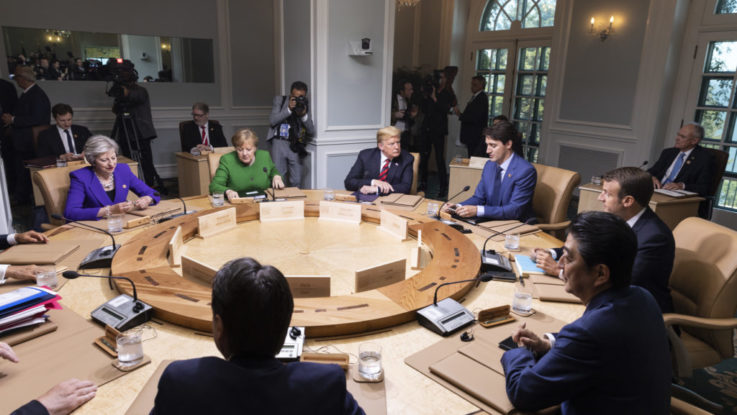
“Weaponized Interdependence” is an exciting new concept in international affairs. Pioneered by international-relations scholars Henry Farrell and Abraham Newman, it refers to the ability of governments to manipulate “choke points” and surveillance capabilities generated by globalization to influence other countries.
Farrell and Newman focus on a specific manifestations of what, in Exit from Hegemony, we call the “infrastructure” of hegemonic and international orders: “the ongoing, often everyday relations, flows, arrangements, and practices that serve as the sinews of international orders.” As we note in Chapter 2:
The infrastructure of contemporary world politics is also composed of complex networks. These include, to list only a few elements: military alliances, partnerships, and basing and access agreements; embassies and consulates; trade and financial flows; and patterns of economic and development assistance. If we take a more granular look at the security infrastructure of the American hegemonic system, we will find recurring joint exercises among militaries, long-standing officer exchange programs, routine bilateral meetings among defense officials, and everyday interactions at standing multilateral security institutions, such as NATO.
As Farrell and Newman point out, the United States needs to be careful when it comes to weaponizing the advantages it gains from interdependence. If Washington convinces other governments that the risks of interdependence with the United States outweigh the gains, they’ll start looking for ways to reduce that interdependence. This is one pathway to “exit from below”: the unravelling of American-led order by states seeking alternatives to the security, economic, and cultural goods provided by the United States.
Farrell and Newman recently wrote a piece in the Monkey Cage in which they argue that weaponized interdependence is helping to produce a return to old-style “fortress economies” (sometimes called “autarky“) in which states prefer self-sufficiency over interdependence. I wrote a gentle critique of their argument at Lawyers, Guns and Money. I argue that states are, overall, more likely to reduce dependence by seeking multiple supplies of the relevant goods, such as trade, mechanisms to transfer capital, and development aid.
Moving toward “fortress economies” is a classic “realist” solution to reducing the kinds of vulnerabilities created by international interdependence. But as their SWIFT example highlights, states can also respond by, in essence, diversifying their portfolios—by increasing the number of suppliers of a particular good. This can involve both developing domestic sources and also a greater number of external providers.
Taken together, this suggests to me less an inevitable retreat to regional trading blocks or national “fortress economies” than mutations in the overall ecology of globalization—ones that may involve reduced interdependencies among some economies but greater interdependencies among others. This parallels trends in security interdependence, where some states, such as Turkey, are moving away from the American system while others remain highly integrated.
In this sense, I think Henry and Abe are correct in their earlier work on weaponized interdependence. Fundamental shifts in the global economy—such as the increasing relative wealth of East Asia in general, and China in particular—are changing the playing field for economic and security policy. But the implications of these shifts for the United States depend a great deal on the choices that it makes.
For his part, Trump is doing his best to highlight the downside risks of tolerating asymmetric interdependence with the United States. Given that no future administration can guarantee that America will never elect another Trump-like figure, it’s very hard to see how Washington can convince foreign leaders not to take those downside risks very seriously in the future. The backdrop of the Bush years, which created significant international backlash against the United States, doesn’t help matters either.

